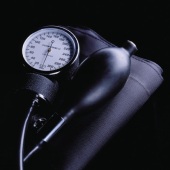And, ingestion of hypertension medications at bedtime linked to reduced risk of new-onset diabetes
THURSDAY, Sept. 24, 2015 (HealthDay News) — Sleep-time ambulatory blood pressure (ABP) predicts new-onset diabetes, and ingestion of hypertension medications at bedtime is associated with reduced risk of new-onset diabetes, according to two studies published online Sept. 23 in Diabetologia.
Ramón C. Hermida, Ph.D., from the University of Vigo in Spain, and colleagues examined the prognostic value of clinic and ABP to predict new-onset diabetes in a cohort of 2,656 individuals without diabetes. The researchers found that during a median follow-up of 5.9 years, 190 participants developed type 2 diabetes. The most significant predictor of new-onset diabetes was sleep-time systolic ABP in a model adjusted for confounding variables. Per one-standard deviation decrease in sleep-time systolic ABP mean there was a 30 percent reduction in the risk of new-onset diabetes.
In a second study, Hermida and colleagues examined whether bedtime ingestion of hypertension medications correlated with reduction in the risk of new-onset diabetes. The trial included 2,012 patients with hypertension without diabetes. During a 5.9-year median follow-up, the researchers identified 171 patients who developed type 2 diabetes. Patients in the bedtime versus the morning-treatment group had significantly lower sleep-time BP mean, greater sleep-time relative BP decline, and lower prevalence of non-dipping at the final evaluation. After adjustment for confounding variables, they also had a significantly lower hazard ratio for new-onset diabetes (adjusted hazard ratio, 0.43).
“Ingestion of the entire daily dose of ≥1 BP-lowering medications at bedtime compared with ingestion of all such medications upon-awakening, results in significantly improved asleep ABP control and prevention of new-onset diabetes,” Hermida and colleagues write in the second study.
Full Text 1 (subscription or payment may be required)
Full Text 2 (subscription or payment may be required)
Copyright © 2015 HealthDay. All rights reserved.








